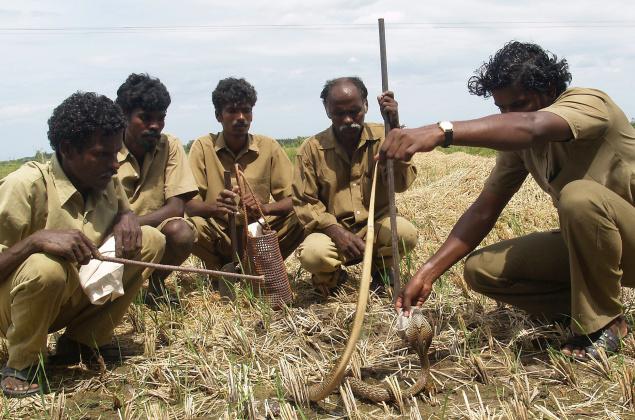Interview with Dr. M.S. Swaminathan
Dr. M.S. Swaminathan, Chairman, National Commission on Farmers, and Chairman of the national committee set up to review the implementation of the Coastal Zone Regulation Act, spoke to Asha Krishnakmar on the various aspects of rehabilitation and restoration.
Excerpts from the interview
What is your assessment of the relief efforts for the tsunami-affected?
The immediate phase of surprise and shock is over. The damage was handled with an enormous magnitude of relief operations. Thanks to modern information and communications technology – television, newspapers and so on – people from all walks of life rushed to provide help. One cannot compensate for lost lives, but property and livelihood loss can be restored to a considerable extent. […]“At Killai, a small village near Pichavaram, about 98 km north of Nagappattinam. The mangroves in the Pichavaram wetland stood as a solid buffer, saving the Irula tribe and about a dozen fishing hamlets from the tsunami.”
Source: Towards sustainable rehabilitation
Frontline: India’s National Magazine from the publishers of THE HINDU
Volume 22 – Issue 04, Feb. 12 – 25, 2005
Address : <http://www.hinduonnet.com/fline/fl2204/stories/20050225002504000.htm>
Date Visited: Thu Jul 07 2011 13:13:18 GMT+0200 (CEST)
[Bold typeface added above for emphasis]

Photo credit: M. Karunakaran © The Hindu >>
Learn more about the Irula community & Snake >>
Up-to-date reports by Indian experts and journalists
Search tips
Combine the name of any particular state, language or region with that of any tribal (Adivasi) community.
Add keywords of special interest (music, poetry, dance just as health, sacred grove and biodiversity); learn about the rights of Scheduled Tribes such as the “Forest Rights Act” (FRA); and the United Nations “Declaration on the Rights of Indigenous Peoples”, “Universal Declaration of Human Rights”, “women’s rights”, or “children’s right to education”.
Ask a question that includes “tribal” or “Adivasi”, for instance: “Adivasi way of life better?” (or “tribal way of life worse?”)
Specify any particular issue or news item (biodiversity, bonded labour and human trafficking, climate change, ecology, economic development, ethnobotany, ethnomedicine, global warming, hunter-gatherers in a particular region or state, prevention of rural poverty, water access).
For official figures include “scheduled tribe ST” along with a union state or region: e.g. “Chhattisgarh ST community”, “Himalayan tribe”, “Scheduled tribe Tamil Nadu census”, “ST Kerala census”, “Particularly Vulnerable Tribal Group Jharkhand”, “PVTG Rajasthan”, “Adivasi ST Kerala”, “Adibasi ST West Bengal” etc.
In case the Google Custom Search window is not displayed here try the following: (1) toggle between “Reader” and regular viewing; (2) in your browser’s Security settings select “Enable JavaScript” | More tips >>
Note: hyperlinks and quotes are meant for fact-checking and information purposes only | Disclaimer >>
List of websites covered by this Google custom search engine
Academia.edu (platform for academics to share research papers) – www.academia.edu
Archive.org – https://archive.org
Centre for Science and Environment – https://www.cseindia.org
Current Conservation – https://www.currentconservation.org
Development and Cooperation (D+C) https://www.dandc.eu
Down To Earth (India) – www.downtoearth.org.in
India Environment Portal – www.indiaenvironmentportal.org.in
Harnessing Nature Magazine – https://harnessingnature.online
Kalpavriksh Environmental Action Group – https://kalpavriksh.org
Mongabay-India – https://india.mongabay.com
M S Swaminathan Research Foundation – www.mssrf.org
Navdanya (protecting India’s biodiversity based food heritage) – https://navdanya.org
Third World Network (Penang, Malaysia) – https://twn.my
The Shola Trust (nature conservation in the Nilgiri region) – www.thesholatrust.org
WorldCat (“the world’s largest library catalog, helping you find library materials online”) – https://worldcat.org
Research the above issues with the help of Shodhganga: A reservoir of theses from universities all over India, made available under Open Access >>
Note: hyperlinks and quotes are meant for fact-checking and information purposes only | Disclaimer >>
Learn more
Atree.org | Ashoka Trust for Research in Ecology & the Environment (posts)
Biodiversity | Hyderabad biodiversity pledge | Nilgiri Biosphere
Climate change | Audio | The Climate Question (BBC Podcast)
eJournals & eBooks | Background guide for education
eLearning: Center for World Indigenous Studies
Forest Rights Act (FRA) | Hunter-gatherers | Legal rights over forest land
Health and nutrition | Recommendations by the Expert Committee
“The tribal food basket has always been diverse and nutritious”
United Nations on climate change
What is the Forest Rights Act about?
Who is a forest dweller under this law, and who gets rights?
Explore India’s tribal cultural heritage with the help of another interactive map >>